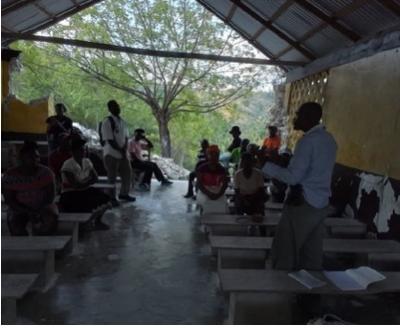
Our partners with the Haitian Christian Community Development (DCCH) have many years of experience in implementing economic development programs in Haiti. They know better than anyone the pitfalls of poorly implemented projects that create a state of dependency rather than empowering the local communities to sustain their livelihoods and build a dignified life.
DCCH now uses technical interventions as a pretext to act on changing mindsets and behaviors. Through a long and slow process of encouraging best agroecological practices, the local communities realize which plant crops generate the most income which then enables better decision making. Project participants also realize that by favoring native plants and trees and diversifying the forest with fruit trees, their land is more resilient to insects and other predators. Through composting, their soil is more fertile, and they understand that if we don't feed the Earth, the Earth will not feed us.
The program that Quixote Center is sponsoring in the communities of Gouin and Saint Helene considers the project participants as the main protagonists. The first quarter of activities focused on creating a mindset where community members are in control of the process and feel ownership over every activity. Instead of telling them what seeds to plant on their land, the technicians ask them "what do you want to plant?" After that, the technicians ask them "how many seeds can you collect yourself?" and the technicians will complete the last third of the seeds, so they have enough for the entire plot.
So far, DCCH convened 30 information sharing sessions where they discussed sustainable land development as well as the benefits of a community credit union. As a result, they established two credit unions. Smallholder farmers pool their own resources and approve small loans with interest determined by the credit union members. At the end of the year membership divides the interest among themselves. They have already approved several small loans for purchasing seeds and fertilizer. The group is also cultivating additional plots of land and planting with tomatoes, corn and peas. Income from the harvest will improve household food security and will also be used to repay loans.
This partnership model, where all program participants are at the decision-making table, has the best chance of securing the long-term results we all wish for. Once the funds dry up, the community will have already ingrained the best practices in money management, seed recollection and rainwater harvesting so that they can grow food all year round. In these times of extreme struggle, it gives us hope to see our partners working hand in hand with the communities of Gouin and Saint Helene. We are grateful to count DCCH as one of our partners in Haiti and thank all of you for your support.


